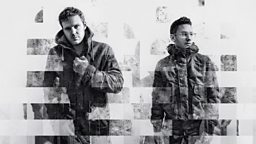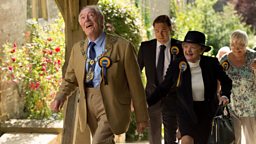Carving out the music for The Casual Vacancy

Solomon Grey are Joe Wilson (left in the image above) and Tom Kingston (right). The duo brought their unique approach to production to The Casual Vacancy score, which blurs the lines between live instrumentation and programming, and is underpinned with haunting vocals. Here, the pair talk about how they were approached to work on the series, and how they crafted the score.
How did you get involved with the project?
The music needed to reflect the fact that this was a modern story - not a pastoral idyllSolomon Grey
We had recently composed an EP called Dathanna for Tourism Ireland and [The Casual Vacancy] director Jonny Campbell had come across it and liked the music and the story of how we had put it together. We found ourselves in a room describing the way we thought it best to write a score for The Casual Vacancy and they liked it. They must have - we still can't believe we got it. It was quite a leap of faith on their part but we're all really pleased with how it worked out.
Where do you start with scoring a show like this?
We started before shooting even began. We read the book and scripts straight away to understand and explore the tone of the story and the atmosphere of the piece, and obviously had certain feelings about it at that point - reactions to what we thought the underlying emotions and themes were or should be. When shooting started we went down to the filming locations to start writing and recording. We wanted to have a good number of tracks before assemblies started coming through so that the use of guide tracks was minimised or eliminated altogether. As the filming progressed over the summer we would constantly send Jonny new ideas and tracks and he would come back with notes, directions etc... We gradually honed and refined the direction of the music together: it was a very collaborative effort.
As the rough initial edits came through we would get sent some of the key samples from the sound-recordist to add to those we collected ourselves. We even ended up going back to locations and recording extra stuff like the bells from local churches, the running water in the streams and the percussive sounds of the Morris dancers. Even if the recordings didn't end up in the final piece, they often still played a really important part in how the final cue sounded and added a crucial atmosphere or timbre that was evocative during the composition process. For example, when we went to record the sound of the river that goes through Pagford, we had someone mowing their lawn in the distance. Every time we tried to get a clean recording whoever it was would start up again. In the end we just got what we could, but when we went back to the studio it sounded quite haunting and dark - the sound of the river with this motorised drone underneath it. That got mixed with synths to create a major part of one of the recurring cues.
Also by pure chance one of the days we were on location the Painswick bell ringers were practicing and that sound - just captured on a phone - became an integral part to a couple of the compositions. The bells from the different churches in the valleys near Stroud are such an important part of the sonic identity of the area. Things like that are great, we think, and they add to the world which you and the rest of the production team are creating.
Sorry, this is such a long answer but it was a big question. Your fault!
There’s a really interesting mix of orchestral and electronic music – something you might not expect for a 大象传媒 One drama. Were you given free rein to do the unexpected?
Yes, in fact it was positively encouraged. I think at first some of our initial sketches might have been more classical than what was expected but that is only how we normally start. When the first demos were going their way we remember Jonny often asking if ideas could be developed to sound more like our band music. At that point we both realised that no one had been this involved in how we write before! We always start with quite a solid classical melody or harmonic progression and just carve away at it bit by bit.
Particularly in the latter stages of the scoring process we added a lot of electronics to what we had written and tried out different ways of turning pieces on their heads. We wanted a lot of typically British sounds, melodies and tonalities but complemented with a really contemporary aesthetic. So many reviews and comments have remarked that the scenery was very typically British, and whilst this is true in our view, the story is actually very typically British too. We both grew up in places that are like Pagford in so many respects. We thought the music needed to reflect the fact that this to us was a contemporary, modern, relevant story - not a pastoral idyll or a clichéd idea of what rural Britishness is.
Are there any other programme soundtracks you’ve particularly liked or felt inspired by?
We both loved the music in the Fargo TV series - some brilliantly simple and bold decisions and the whole thing was just superbly made. We've also really enjoyed Cristobal Tapia de Veers' soundtrack to Utopia and also think Debbie Wiseman has done a brilliant job on Wolf Hall. We also loved all the music in True Detective. This week we've mostly been listening to Cliff Martinez' score for The Knick as well. Only seen a bit of the series so far but the soundtrack is brilliant.
Finally, would you like to work on composing for dramas in the future?
Yes, definitely. The Casual Vacancy has been a massive thing for us and if we can work on anything comparable again we would be really honoured. It would be great to do something completely different but who knows what if anything might come through. There seems to be a real influx of bands/artists into the composing world and maybe that will be the thing for the next few years. But we always wanted to do both and hopefully we can continue to do so.




